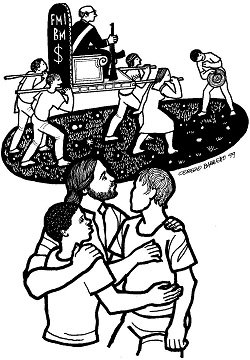Commentary to the 29th Sunday in Ordinary Time B
 The readings today are about service. The first reading is taken from the Fourth Servant Song from the second part of the Book of the Prophet Isaiah. This section of Isaiah, chapters 40 to 55, emphasizes God's care and comfort for his people. The Servant of the first reading intercedes with God for the people, taking upon himself their wrong doings and accepting the punishment their sins incur. This was written over 500 years before Jesus, yet it prophesied Christ's determination to accept the cross. Jesus is the one who stands before the Father for us, and before us for the Father. The Letter to the Hebrews notes that He Himself responded to the call from his Father to be a mediator or priest for the people. Today’s Gospel adds that those who wish to follow Christ must do so not by seeking power and glory, but by seeking service.
The readings today are about service. The first reading is taken from the Fourth Servant Song from the second part of the Book of the Prophet Isaiah. This section of Isaiah, chapters 40 to 55, emphasizes God's care and comfort for his people. The Servant of the first reading intercedes with God for the people, taking upon himself their wrong doings and accepting the punishment their sins incur. This was written over 500 years before Jesus, yet it prophesied Christ's determination to accept the cross. Jesus is the one who stands before the Father for us, and before us for the Father. The Letter to the Hebrews notes that He Himself responded to the call from his Father to be a mediator or priest for the people. Today’s Gospel adds that those who wish to follow Christ must do so not by seeking power and glory, but by seeking service.
As Christians we are all called to be like Jesus. We are called to bring God to others and others to God. Some of us are called to have our spiritual characters transformed so that we can mediate Christ through the sacraments and preaching the word. That is the sacrament of ordination does. Those of us who have answered this call receive the joy of extending the real presence of Christ to others. And it is a real joy.
Certainly, bishops, priests and deacons do not have a monopoly on bringing Christ to others and others to Christ. In fact, so many times in the past the Church has usurped the role of the laity in being Christ to others. For example, the first teachers of the faith to children are the parents, not the parish priest. If, as has happened at times in the past, parents are not taught how to train their children and are made to feel that they are incapable of giving their children religious instruction, then the Church has stolen their primary role from them.
The same holds for all forms of Christian action. We all are obligated as Christians to take the initiative of bringing Christ to heal a stressful situation. If someone in your neighborhood is hurting, you have a responsibility as a Christian to reach out to him or her. You do not need to receive a phone call from the parish. This is the Christian common sense that you all have, God bless. When you exercise your Christianity in this way, you are responding to the call to be like Jesus. He was always concerned about the less fortunate, the grieving, the persecuted. He didn't need anyone to tell him what to do. He was compassionate and acted out of his compassion. He came, according to the last words of the Gospel, not to be served but to serve, to give his life for the many.
We are called to be like Jesus. No, we can not take the place of the Divine Mediator, but we are called to be like Him. We are called to give of ourselves to the Lord wholly and freely out of love for his people. We are called to be compassionate. We are called to be Christians.
We took upon ourselves a tremendous burden when we accepted our baptism. It is the burden of so identifying with Christ that others can not help but see Christ in us. Ignatius of Antioch, our patron whose feast we celebrated last Wednesday, identified with Christ in this way. You remember the long journey to Rome to be killed in the Colosseum. During those two to three years, wealthy Christians wanted to bribe the Roman captors. Ignatius would not let them. He reasoned that Jesus could have saved himself from his cross, but refused to do so out of love for his Father and service for his Father’s people. Ignatius would not allow anyone to prevent him from giving witness to Christ.
The burden of Christianity is tremendous, and yet at the same time it is light. Jesus said, “Take my yoke upon your shoulders and learn from me for my yoke is easy and my burden is light.” Jesus helps us bear the burden of Christianity. He helps us to be Christians. He helps us mediate his presence for others. He helps us bring his presence to others and others to his presence. He helps us accept our pains and sorrows for others. He helps us to respond to his call of greatness through service. “Anyone among you who aspires to greatness must serve the rest.”


 Votes : 0
Votes : 0









